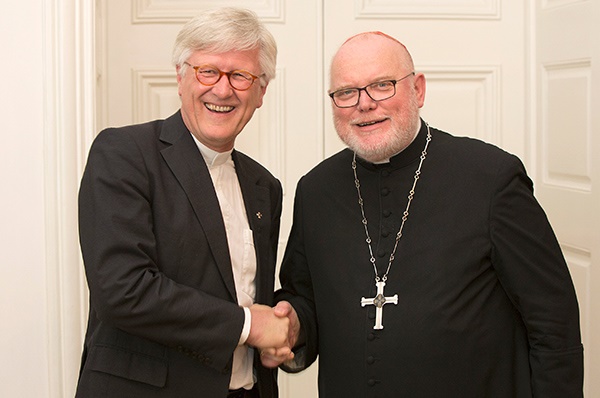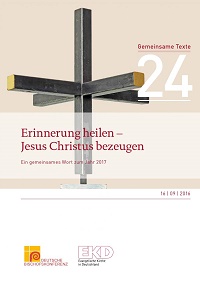German Protestants and Roman Catholics turn 2017 into celebration of ecumenical unity
Several events to share “common faith” and “heal wounds” of the past are organised in Germany. Most evangelical Christians dissociate themselves from this ecumenical approach.
BERLIN · 26 SEPTEMBER 2016 · 18:09 CET

In 2017, millions of Protestants and evangelical Christians around the world will celebrate the start of the Protestant Reformation and the return to the centrality of the Bible.
It was in 1517 when Martin Luther started his public fight against the minimisation of God’s Word, the commercialisation of salvation and the belief in purgatory, among several other issues of his time.
500 years later, the Protestant state church in Germany (EKD) will commemorate Luther while seeking unity with the Roman Catholic Church.
On September 16, the highest authorities of both churches in Germany, Protestant Bishop Heinrich Bedford-Strohm and Roman Catholic Cardinal Reinhard Marx, signed a 92-page document in which they agreed to turn the 500th anniversary of the Reformation into an ecumenical year in which “we confess Jesus Christ together”.
CATHOLIC CARDINAL: “UNITED IN THE FAITH”
Cardinal Marx said he believed 2017 will show “how deeply both churches are united in the faith”.
The German Roman Catholic authorities are saddened by the “broken unity of the Church”, but “a joint Christ Fest” could help to take a new direction, Marx believes.

According to Marx, stereotypes are “an obstacle in the way to a visible unity among our Churches”. Therefore, the celebration of ecumenical events in 2017 will be “an almost revolutionary highlight”.
PROTESTANT LEADER: WE HAD “KNOW-IT-ALL ATTITUDES”
Bishop Heinrich Bedford-Strohm, on the Protestant side, also spoke about the divisions and fights of the past. Both churches have sinned by having “narrow know-it-all attitudes”, he believes.
The Protestant leader said doctrinal differences should not be hidden but brought on the table. In this sense, the Protestant Bishop celebrated the role the Joint Declaration on the Doctrine of Justification (1999) has played in the ecumenical history of the Protestant and Roman Catholic Churches.
JOINT ACTIVITIES IN 2017
In 2017, the two Churches will hold joint events. From October 16-22, representatives of the Protestant EKD and the Roman Catholic Church will travel together to Israel. In February, a united Bible Day will be celebrated in Stuttgart.
In March, a reconciliation service will be held, in which both Churches will ask each other for forgiveness. Several other reconciliation services will be celebrated around Germany throughout the year.
In Lund (Sweden), Pope Francis has accepted the invitation of the Lutheran World Federation to commemorate the 31st October together.
EVANGELICAL CHRISTIANS: “UNITY CAN BECOME AN IDOL”
The majority of evangelical Christians do not agree with this approach to the 500th anniversary of the start of the Reformation.
“In today’s ecumenical world, when unity is in danger of being idolized, it takes courage to affirm that the Bible stands over tradition and the church, that Christ is the only mediator, that grace is all you need for your salvation, and that God is a jealous God”, Vatican expert and Italian Evangelical Alliance board member Leonardo de Chirico says in an article.
“It takes courage to make unity dependent on these Biblical truths and not elevating unity to the place of ‘first imperative’. Where these courageous Christians are, there the Reformation will be adequately celebrated. Otherwise, it will only be commemorated”.
The President of the Commission of Theology of the Spanish Evangelical Alliance, José Hutter, has also expressed the need to represent Martin Luther in a faithful way: “The cult of the saints and the commerce of indulgences were some of the main reasons that caused the explosion of the Protestant Reformation. The Roman Catholic Church continues to promote the same errors.”
Efraim Tendero, Secretary General of the World Evangelical Alliance (WEA) expressed his desire to dialogue with Roman Catholics and work together in certain issues, but excluded ecumenism. Read his interview with Evangelical Focus.
Published in: Evangelical Focus - life & tech - German Protestants and Roman Catholics turn 2017 into celebration of ecumenical unity
